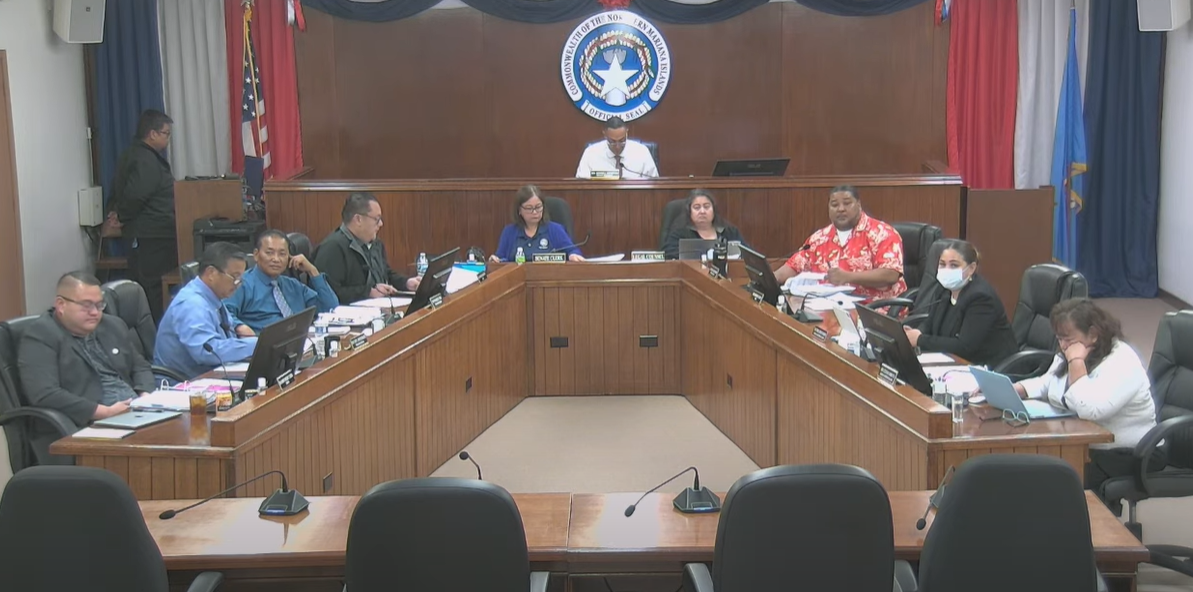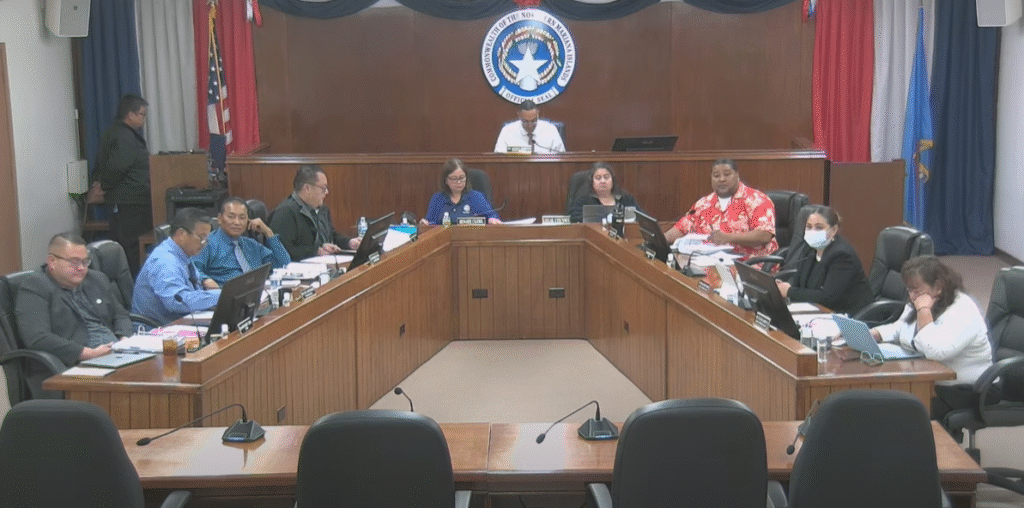
The Senate in session on Monday, July 14, 2025.
BY a vote of 6 to 2, the Senate on Monday adopted the Senate Committee on Gaming’s report recommending the rejection of Gov. Arnold I. Palacios’ Executive Order 2025-2, which seeks to abolish the Commonwealth Casino Commission.
The House of Representatives has until Aug. 1, 2025, to follow suit.
Voting to reject the executive order were Senate President Dennis Mendiola, Senate Vice President Karl King-Nabors, Senate Floor Leader Donald Manglona, Sens. Jude Hofschneider, Frank Q. Cruz, and Corina Magofna.
Casting the dissenting votes were Sens. Celina Babauta and Manny Gregory T. Castro. Sen. Ronnie Calvo was excused.
Magofna, chair of the Senate Committee on Gaming, provided background on the panel’s deliberations prior to Manglona’s motion to adopt the committee’s report.
Magofna said the governor’s executive order exceeds the bounds of executive authority by nullifying existing statutes and creating a new agency in its place — actions that may infringe on the Legislature’s constitutional authority to make laws.
She said the order does not merely transfer duties from the CCC to the Lottery Commission; it also terminates sitting commissioners for cause and replaces them with Lottery Commission members who do not meet the legal qualifications for casino commissioners.
Magofna said there is no evidence that the CCC commissioners neglected their duties or committed misconduct. She emphasized that removing representation from Tinian and Rota — by abolishing the CCC — violates the intent of Public Law 18-56, which legalized casino gaming on Saipan and created the CCC.
According to Magofna, the executive order also creates a conflict of interest involving the Office of the Attorney General. The AG’s office, which represents CCC in legal matters — including ongoing litigation involving exclusive casino license holder Imperial Pacific International — would now also serve as a voting member of the Lottery Commission. The other members of the Lottery Commission are the secretaries of Finance and Commerce and the commissioner of the Department of Public Safety.
Magofna argued that the EO creates additional uncertainty and obstacles for the casino industry, describing the executive order as containing “many unknowns and ambiguities” regarding the transfer of regulatory authority.
“A better course of action would have been for all stakeholders to come together and discuss proposed amendments to the current casino law,” she said.
Senate President Mendiola emphasized what he called “the biggest concern — and really alarming.” He recalled that when the casino law was enacted, a central motivation was to protect CNMI retirees. That, he said, was the driving force behind the creation of the casino industry. Even during negotiations for the $15 million exclusive casino license fee, Mendiola said, the primary consideration was the fate of the Commonwealth’s retirees.
So, transferring the CCC’s responsibilities to the Lottery Commission would, he added, eliminate representation from Tinian and Rota — something he finds deeply troubling.
“That is the biggest concern for me,” Mendiola said. “As someone elected [by] the First Senatorial District [Rota], I’m most concerned that the EO does not ensure that Rota and Tinian have a voice in the gaming industry.”
Dissenting view
Sen. Celina Babauta opposed the committee report, saying: “Let me be clear: the EO is not a power grab. It’s a strategic correction and realignment of regulatory authority that reflects the current fiscal realities of our government — especially given the lack of an active casino on Saipan or anywhere in the Commonwealth.”
She said the CCC was established to regulate a single exclusive licensee, Imperial Pacific International, which, she added, “has failed in every measure of its obligations — financial, legal, moral.”
“IPI has exploited our people, racked up massive unpaid debts, and sparked multiple federal and international investigations,” she said. “Yet we continue to fund a regulatory agency that has no casino to regulate and no clear path to self-sustainability.”
The CCC is supposed to be funded by the annual regulatory fee paid by the casino license holder.
In response to Magofna’s assertion that CCC commissioners committed no wrongdoing, Babauta said, “The most glaring violation in my eyes is that they did not fulfill their fiduciary duty to collect IPI’s past debts. Instead, they allowed IPI to balloon its debt to the CNMI government — and that’s why we’re now in a position where we can’t collect anymore.”
According to news files, the CCC issued orders in 2021 to force IPI to honor its obligations. Early last year, the CCC conducted a license revocation hearing. IPI, however, filed for Chapter 11 bankruptcy protection in federal court.
Babauta argued that the EO proposes consolidating CCC’s core functions, such as compliance, recordkeeping, and institutional knowledge, under the Lottery Commission — “which, after all, was the body that repeatedly amended IPI’s license,” she said.
Until such time as the casino industry revives — “if ever,” she added — the EO is not about dissolving the gaming industry but about applying “sound fiscal prudence and accountability.”
“We need to stop pretending the current structure works. It does not. It has not,” Babauta said. “Rejecting the EO sends the wrong message to our people — that we’d rather cling to a broken system than take bold action to fix the inefficiencies of the CCC.”
Castro’s view
Sen. Manny Castro said he actually believes the governor “should issue more executive orders to clean up the bloated government we have.”
He acknowledged the CNMI’s dire economic condition and said he wasn’t entirely against the committee’s report, but that the Commonwealth needs to reduce bureaucratic red tape.
“If we need to cut,” he said, “I’d rather cut the boards and commissions than cut our frontline managers and our people.”
Responding to Babauta’s defense of the EO, Senate Vice President Karl King-Nabors questioned the timing of the governor’s action.
“If these were such pressing issues — and if CCC was a scourge that hadn’t fulfilled its fiduciary duties — why is the EO only coming now?” he asked. “How long has the governor been in office?”
He continued: “If these issues were so imminent or posed a danger to the Commonwealth, why was there no letter or recommendation sent to the Legislature to address them? Instead, he uses executive power to move the wheels of government unilaterally.”
King-Nabors said that, in his view, the Lottery Commission does not have the institutional knowledge or capacity to take on CCC’s regulatory role.
He noted that the Lottery Commission members were invited to testify before the Senate about their ability to assume the CCC’s responsibilities. “They didn’t have time to come to the Senate and explain anything,” he said. “And now I’m supposed to believe they have time to do everything CCC does — while also serving as cabinet members?”
“This is a very dangerous precedent for the legislative body to accept,” he said.











